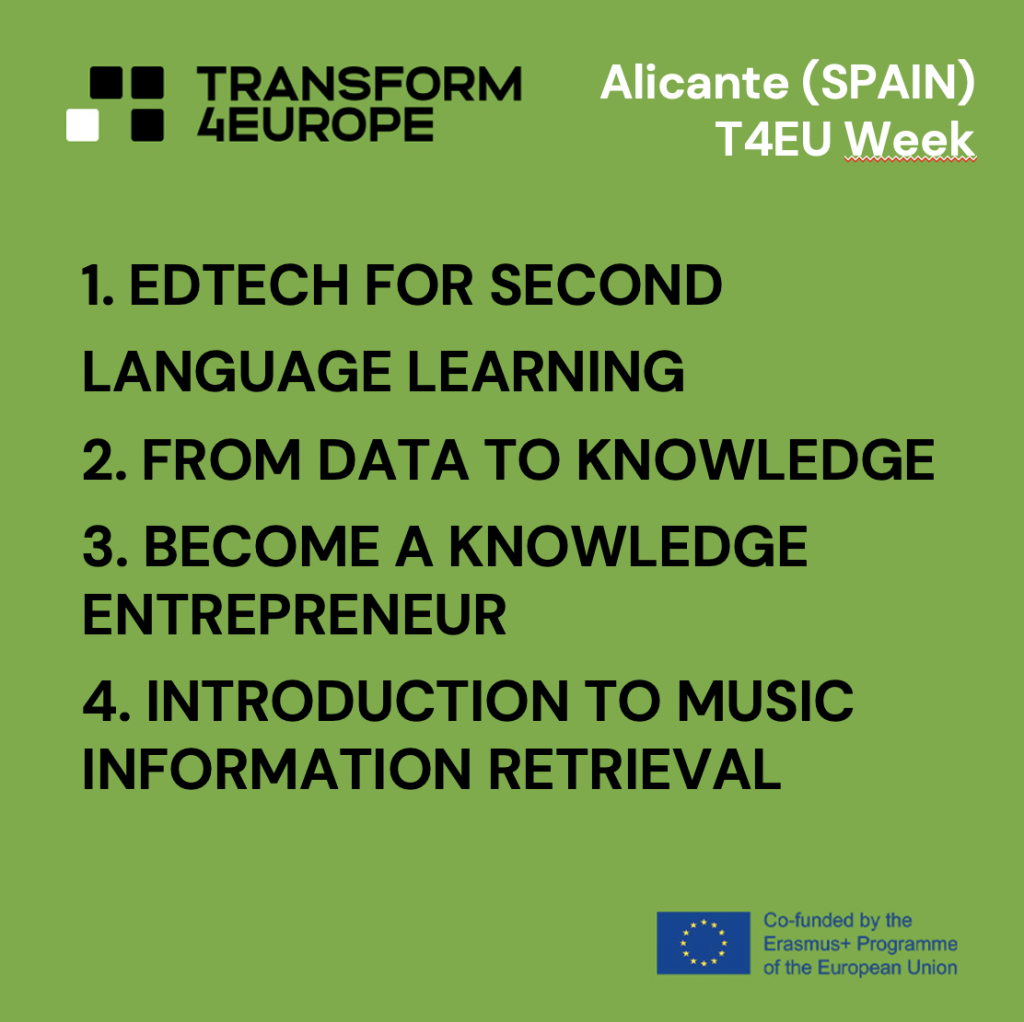T4EU Week in SPAIN
We invite Transform4Europe students to Spain!
8-10 May 2023 | The University of Alicante, Spain
- event for: all
- form of the event: face-to-face
- language: English
About
We would like to invite students from all Transform4Europe partner universities to participate in the first edition of the Transform4Europe Week held at the University of Alicante, Spain. The theme of the event is “Digital Transformation” and will address issues of current relevance and interest such as data management, the use of technologies for second language learning, music information retrieval or entrepreneurship networking. We look forward to seeing you there!
- download the T4EU Week programme (PDF, 171 KB)

Workshops
Participating students must choose one of the four wokshops offered by the UA. Each course has a duration of 21 hours (14 classroom hours + 21 homework hours), the equivalent of 1.4 ECTs. In addition, students will have to participate in the introductory lecture and in the different cultural activities organised by the university. A total of 20 places will be offered per course.
Detailed information about the courses can be found below:
module name
Become a Knowledge Entrepreneur
Module teacher: Theresa Zimmer and Niklas Geroge, University of Saarland
The workshop “Become a Knowledge Entrepreneur” is aimed at students of each Transform4Europe partner university. The workshop will be conducted in two days. In the workshop, participants reflect on their own knowledge, skills and abilities and discuss networking strategies. These strategies are then used to develop initial ideas on how to advance social, ecological, and digital transformations.
module name
From data to knowledge
Module teacher: Jose Norberto Mazón Lopez and David Tomás Díaz, University of Alicante
This workshop provides an overview of the knowledge discovery in databases pipeline, that is, the process of discovering useful knowledge from large collections of data.
After completion of this workshop the student should be able to:
• Understand the concept of big data scenarios and their relationship with the latest technologies (e.g. IoT and Artificial Intelligence).
• Understand technological and legal issues of open data (formats and licenses).
• Identify opportunities and benefits of reusing open data, as well as data sharing between private and public entities.
• Understand the fundamental concepts of data mining, including its definition, purpose, and applications in various fields.
• Describe the various stages of the data mining process, including data collection, preparation, modelling, and evaluation.
• Apply exploratory data analysis techniques, including central tendency measures and visualisation, to gain insights into the data and prepare it for modelling.
• Apply machine learning algorithms such as support vector machines, decision trees, and neural networks, to build predictive models and evaluate their performance.
• Understand the principles and techniques of text mining.
• Apply text mining techniques to analyse text data, such as customer reviews, and news articles.
module name
Introduction to Music Information Retrieval
Module teacher: Jorge Calvo Zaragoza, José Javier Valero Mas, María Alfaro Contreras and Juan Carlos Martínez Sevilla, University of Alicante
This workshop aims to make the Music Information Retrieval (MIR) field known both to the general public and to those interested in a possible career path, whether research or industrial. We will cover many aspects, both from conceptual and technical points of views, related to the field in general but also on specific tasks (music classification, audio transcription, automatic composition, etc.). We will naturally integrate in the lectures the tools typically considered for building MIR systems, such as artificial intelligence and signal processing.
The workshop is addressed to any student interested in the intersection between music and technology. Some background in the technological aspect (audio processing, programming, artificial intelligence, etc.) is recommended but not required.
At the end of the workshop, students:
• will have a broad knowledge of the MIR field.
• will acquire skills to understand the fundamentals of audio signal processing applied to music data.
• will acquire skills to understand the fundamentals of artificial intelligence applied to music data.
• will understand the different challenges associated with this field in a simple way.
• will have references and tools to understand how MIR systems work.
• will know the possibilities that the MIR field offers at a scientific, technical and business level.
module name
EdTech for Second Language Learning
Module teachers: Dr Copelia Mateo, Mr Javier Fernández, Dr Julián López and Dr María Felicidad Tabuenca, University of Alicante
In this workshop, students will learn how to design Computer Assisted Language Learning (CALL) activities considering the different pedagogical and methodological theories of second language learning. This workshopalso explores some current technological tools that
have been demonstrated to be efficient to teach a foreign language.
The materials of the workshop will be available for students on the Moodle platform.
Main objectives of the workshop:
(a) Introduce the most relevant language teaching technological approaches.
(b) Give students a repertoire of some current and well-known technological tools that have been demonstrated to be efficient to teach a foreign language.
(c) Provide students with strategies to use the technological tools proposed in an effective way so they can provide the support needed to guarantee more effective learning.
(d) Use technologies to create meaningful materials and activities for second language learning.
Cultural and Social Stream
Every participant in the T4EU Week is welcome to participate in the events complementary to the workshops: Visit to the Castle of Santa Bárbara, concrete of the Choir of the University of Alicante, visit to the emblematic Casino of Alicante, among others.


